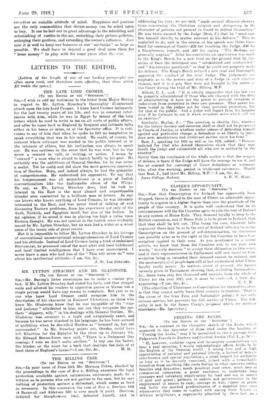LETTERS TO THE EDITOR.
[Letters of the length of one of our leading paragraphs are often more read, and therefore more effective, than those which fill treble the space.]
THE LATE LORD CROMER.
[To THE EDITOR OP THE " SPECTATOR.") SIR,-1 wish to add my testimony to the letter from Major Baring in regard to Mr. Lytton Strachey's thoroughly ill-informed attack upon the late Lord Cromer. I knew Lord Cromer intimately for the last twenty years of his life, and was in constant inter- course with him, while he was in Egypt by means of the long letters which he used to write to me on all sorts of public affairs, and after he came back to England by frequent and intimate talks either in his house or mine, or at the Spectator office. It is ridi- culous to say of him that when he spoke he felt no temptation to speak everything that was in his mind. He could, of course, be reticent where reticence was needed in the public interest or in the interests of others, but his inclination was always to speak out. He was cautious in the sense that he was wise, but he was never a coward in talk, or writing, or action. I mean by "coward " a man who is afraid to march boldly to his goal. He certainly was the antithesis of General Gordon, for he was never a zealot. Yet he could and did show the most generous apprecia- tion of Gordon. Here, and indeed always, he had the sympathy of comprehension. He understood his opponents. To say that his temperament was all monochrome is a piece of foolish conventionalism like the fashionable abuse of the Whigs. To say, as Mr. Lytton Strachey does, that he took no interest in the East is the most absurd and unpardonable blunder ever committed by a brilliant man of letters. As any one knows who knows anything of Lord Cromer, he was intensely interested in the East, and was never tired of talking of and discussing Eastern problems, from his experience not only of the Arab, Turkish, and Egyptian mind, but also of the Indian. In my opinion, if he erred it was in placing too high a value upon Eastern thought. He was not cynical in the foolish sense evidently meant by Mr. Lytton Strachey, but no man had a wider or a wiser sense of the ironic side of great events.
.But it is impossible to follow Mr. Lytton Strachey in his farrago of conventional unconventional misapprehensions of Lord Cromer and his attitude. Instead of Lord Cromer being a kind of embalmed Bureaucrat, he possessed one of the most alert and least hidebound and least limited intelligences that I have ever encountered. I never knew a man who had less of the "This will never do" tone about his intellectual attitude.—I am, Sir, &c.,
J. Sr. Lox STEAM!.


























 Previous page
Previous page